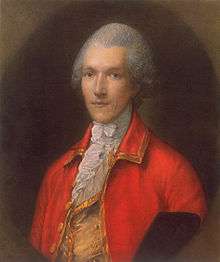King's American Dragoons
The King's American Dragoons were a British provincial military unit, raised for Loyalist service during the American Revolutionary War. They were founded by Colonel Benjamin Thompson, later Count Rumford, in 1781.[1] They were initially formed from the remnants of other British Loyalist units, including Black Loyalist soldiers.
| King's American Dragoons | |
|---|---|
 Lt.Col. Benjamin Thompson Count Rumford | |
| Active | 1781-1783 |
| Country | |
| Allegiance | |
| Branch | dragoons (mounted infantry) |
| Type | British provincial unit, (auxiliary troops) |
| Role | demolition, construction |
| Size | ? |
| Garrison/HQ | Long Island, Province of New York |
| Engagements | American Revolutionary War Never saw combat |
| Commanders | |
| Notable commanders | Major General Sir Guy Carleton Lieutenant Colonel Benjamin Thompson |
The King's American Dragoons primarily served on Long Island in 1782 and early 1783,[2] where they earned local notoriety for destroying a church and burial ground in order to erect Fort Golgotha in Huntington.[3]
They were evacuated from New York and resettled in St. John, New Brunswick, in July 1783.[4] They were disbanded there in October.[5]
References
- Ellis, George Edward; Sciences, American Academy of Arts and (1871-01-01). Memoir of Sir Benjamin Thompson, count Rumford: with notices of his daughter. Estes and Lauriat.
- Siebert, Wilbur Henry (1916-01-01). The Loyalist Refugees of New Hampshire. Ohio State University.
- "Archived copy" (PDF). Archived from the original (PDF) on 2011-04-29. Retrieved 2010-12-16.CS1 maint: archived copy as title (link)
- Ellis, George Edward; Sciences, American Academy of Arts and (1871-01-01). Memoir of Sir Benjamin Thompson, count Rumford: with notices of his daughter. Estes and Lauriat.
- Ellis, George Edward; Sciences, American Academy of Arts and (1871-01-01). Memoir of Sir Benjamin Thompson, count Rumford: with notices of his daughter. Estes and Lauriat.
This article is issued from Wikipedia. The text is licensed under Creative Commons - Attribution - Sharealike. Additional terms may apply for the media files.